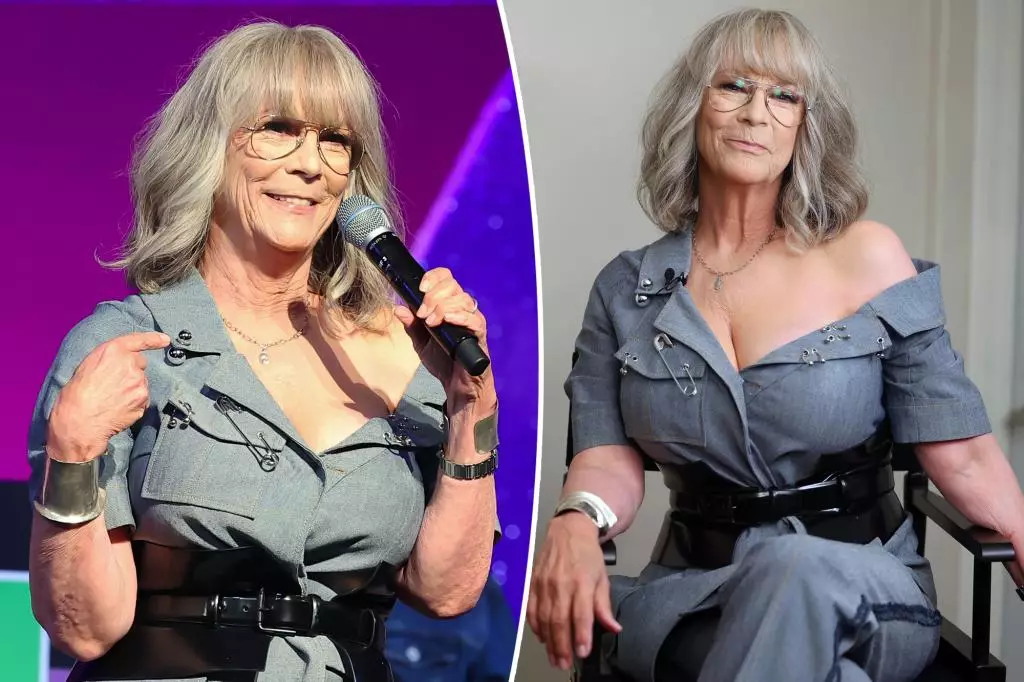Jamie Lee Curtis’s recent reveal of her viral “Freakier Friday” outfit marks a powerful moment of defiance against Hollywood’s often unattainable beauty standards. Instead of conforming to ageist stereotypes that dictate women must hide or diminish their bodies to appear “appropriate,” Curtis embraces her sexuality and confidence openly. Her playful joke about the ensemble receiving more attention than her Instagram posts illustrates her refusal to let societal judgments diminish her self-worth. In an industry built on appearances, Curtis boldly asserts that age is just a number and self-assurance is the ultimate form of empowerment. Her decision to wear a revealing costume while in character exemplifies her commitment to authentic self-expression, rather than succumbing to the pressure to look youthful or demure.
Redefining Aging and Beauty on Her Own Terms
At 66, Curtis’s comments about feeling “more beautiful” than ever challenge the pervasive narrative that beauty wanes with age. Her public stance that attractiveness does not diminish but can evolve, is a refreshing breath of fresh air in a culture obsessed with perpetual youth. By sharing her perspective, she encourages women to celebrate their changing bodies and reject societal obsession with superficial perfection. Her openness about her own transformational journey, including her past plastic surgeries, reveals a nuanced view that recognizes both the imperfections and strengths intrinsic to aging. Curtis’s candidness serves as a blueprint for women to embrace their authentic selves instead of chasing unnatural ideals propagated by a beauty-industrial complex.
Voicing Critique Against Cosmetic Industry Exploitation
Curtis’s outspoken critique of the plastic surgery and cosmetic industry underscores her commitment to social honesty. Her remarks about the “genocide” of self-esteem among women affected by the relentless pursuit of perfection highlight her awareness of the industry’s destructive influence. Her symbolic gesture of posing with wax lips, coupled with her vocal opposition, positions her as a fearless advocate for natural beauty and mental well-being. This stance is particularly significant because it challenges the deep-rooted commercial motives encouraging women to alter their appearances at great cost—physically, emotionally, and financially. Curtis’s commentary urges women to question the motives behind cosmetic procedures and to resist societal pressures that equate aging with inadequacy.
Authenticity Over Approval in a Digital Age
Curtis’s interaction with her followers on social media exemplifies her authenticity in an era dominated by curated perfection. Her lighthearted jokes about her “more attention” outfit demonstrate her refusal to take herself too seriously while maintaining a message of self-confidence. The playful comments, including references to her past work and her unapologetic display of her curves, serve as reminders that aging gracefully can also mean embracing one’s body unabashedly. Her willingness to discuss her own regrets about plastic surgery offers a vulnerable, honest perspective that resonates with many women facing similar dilemmas. Curtis consistently champions self-acceptance, urging women to resist the exploitative beauty standards fed by many Hollywood narratives, and to instead find strength in their true selves.
Reimagining Female Power and Self-Love
Ultimately, Curtis’s journey underscores an empowering message: true beauty is rooted in authenticity and self-love. Her boldness defies the superficial stereotypes that diminish women as they age, urging a cultural shift toward embracing the complexities of womanhood at all stages. Her stance invites women to reject the societal pressures that urge them to constantly chase youth or perfection, and instead celebrate their individuality and inner confidence. Curtis exemplifies how aging, when approached with honesty and humor, can be an act of rebellion—a declaration that women are powerful, beautiful, and deserving of respect, regardless of their age or societal expectations.
Drawing from her own experiences and unapologetic attitude, Curtis’s story encourages a broader conversation: one that centers on realism, acceptance, and genuine self-love. In a world obsessed with perfection, her message resonates as a vital reminder that true beauty radiates from authenticity and confidence, not from conforming to ever-changing ideals.

